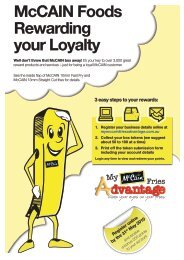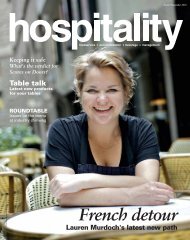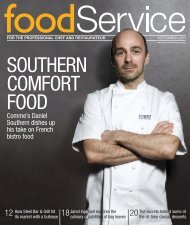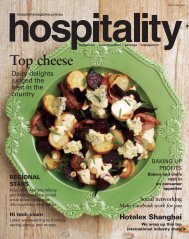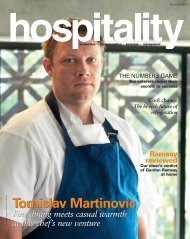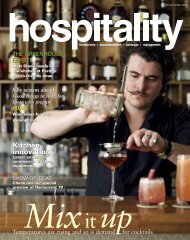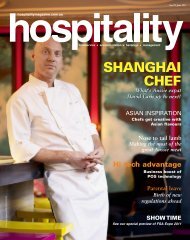download Hospitality August 2010 - Foodservice Gateway
download Hospitality August 2010 - Foodservice Gateway
download Hospitality August 2010 - Foodservice Gateway
You also want an ePaper? Increase the reach of your titles
YUMPU automatically turns print PDFs into web optimized ePapers that Google loves.
management<br />
doctorhospitality<br />
I usually hang up on job applicants who ask to be<br />
paid in cash, but I know we are missing out on<br />
some good applicants. Am I being stupid?<br />
You’re doing the right thing and it’s frustrating to see<br />
others who don’t. Many people think there’s a benefit to<br />
not being paid officially but point out to them that they<br />
won’t be able to obtain a credit card without a record of<br />
earning, and will find it difficult to get a reference for<br />
renting a flat. These people are also more transitory —<br />
they don’t want to make commitments.. And if they’re<br />
injured, they’ll definitely want to be ‘on the books’ for<br />
compensation. Be smart and stay safe.<br />
What’s the formula for pricing a wedding?<br />
It’s not as easy as just multiplying costs by three, four or<br />
five. The more you can sell the ‘specialness’ of your<br />
facilities, the more you can charge for more than just<br />
food, drink and staff costs. Some caterers work on a 20<br />
per cent food cost, others allow the costs to be higher.<br />
Check competitor pricing and aim for clientele that is not<br />
chasing the cheapest deals. Add in a charge for room hire,<br />
and have a range of attractive options such as theming,<br />
decorations, chair covers and cocktails — some of these<br />
can be given for free to close a deal. Make sure your<br />
website, phone answering, menus and service are all of<br />
the highest quality and people will understand why your<br />
prices are a little more.<br />
I’m the new operations manager of a tired old pub,<br />
with lots of ‘deals’ for regulars and mates. How do<br />
I convince the boss this needs to change?<br />
Once you and the boss agree on a vision of the business’s<br />
future, it will be much easier to work on steps towards<br />
achieving it. Gather your facts and identify the areas of<br />
weakness, eg bistro sales, spirit sales etc. Use the 80/20<br />
principle to look at the 80 per cent of customers who only<br />
give you 20 per cent of your sales, and vice-versa. Hard<br />
decisions have to be made about losing some of the lowvalue<br />
customers. Keep talking about the future vision —<br />
when you have agreement on that the tough decisions<br />
are easier for the boss to agree with.<br />
Everyone’s talking about Foursquare and ‘location<br />
marketing’. What is it and should I worry - I’m only<br />
just on top of Facebook.<br />
Most new mobile phones can track where you are, so it’s<br />
now possible to make offers to people based on their<br />
location. Foursquare.com is one of the first of these<br />
location services, and is popular with people who like to<br />
play games with their phones. By adding the Foursquare<br />
‘app’ to a phone, they can check in at a business and<br />
become the ‘Mayor’ if they visit more than others.<br />
Businesses can create offers that will come up as alerts<br />
when a person checks in. Perhaps a free coffee on every<br />
third visit? It’s time for every business owner to start<br />
using the latest smartphones and get comfortable with<br />
how customers are using them. Keep Foursquare on your<br />
radar.<br />
Got a question? Send it to the doctor via <strong>Hospitality</strong>'s<br />
editor at rosemary.ryan@reedbusiness.com.au<br />
Wining ways to boost dining<br />
Don’t scare off potential dining regulars with over inflated wine<br />
prices, says our columnist.<br />
HOW does that line from that old song go?<br />
Aah, that’s it; everything old is new again.<br />
Seems it’s something we should all be<br />
singing about the Brits. Apparently, after all<br />
these years, they have discovered BYO. And<br />
they’ve done so at a time when the joys of<br />
such dining are steadily disappearing from<br />
the restaurant scene here.<br />
Mind you, they’ve done it — or at least are<br />
trying to do it — with a completely new<br />
twist, one that aims at getting the restaurants<br />
on side rather than antagonising them as<br />
seems to have been the case in Australia.<br />
There is even money involved, which seems<br />
an odd feature of what we have come to view<br />
as a cost-cutting measure and a riposte to<br />
high mark-ups.<br />
Two enterprising entrepreneurs (or opportunists,<br />
even) have enlisted a number of upper-crust<br />
and fine-dining restaurants into the<br />
BYO Wine Club. Diner members of the club<br />
are paying an annual fee of £75 (about $127<br />
at current fluctuating exchange rates) for the<br />
pleasure of taking their own booze rather<br />
than ordering off the restaurants’ own (often<br />
quite expensive) lists.<br />
This means the cheapest bottle of supermarket<br />
plonk can be unscrewed and poured<br />
by a sommelier at some of the swankiest and<br />
most exclusive nosh-pits in the land. And<br />
they promise to do so without critical comment<br />
or a haughty sniff of derision.<br />
The positive aspect for the restaurants<br />
who have signed up to this Clayton’s style of<br />
BYO is that they remain in control of when<br />
such liberties can be taken with their normal<br />
order of things.<br />
Some decree it’s a lunchtime only concession.<br />
Some say Monday to Thursdays only.<br />
Another limits it to just one night a week —<br />
the normally dead Monday.<br />
The expectation is not so much that club<br />
members will be shaming the tables of finedining<br />
eateries with cleanskins and wine that<br />
could double as vinegar, but that they will<br />
bring special wines for special occasions.<br />
They can have that bottle of 1960 Grange<br />
hoarded from birth uncorked and decanted<br />
at a 50th dinner party with food to match.<br />
The scheme applies to bottles of wine only<br />
— no beer, spirits, ‘alcopops’ or chateau<br />
cardboard. And members are told to discard<br />
all paper bags and similar packaging before<br />
entering the restaurant; there’s nothing tacky<br />
about this style of BYO.<br />
It is certainly not something that provides<br />
huge financial advantages to members, especially<br />
as the annual fee is soon to rise to £100<br />
(around $170). You would need to be a fairly<br />
regular diner and something of a cheapskate<br />
in your choice of wines to show much<br />
of a profit.<br />
The real advantage here is for restaurants<br />
at the upper end of the market who tend to<br />
scare off punters not with the price of their<br />
food, but with high mark-ups on their wine<br />
lists and the universal lack of any bottles at<br />
the cheaper end of the scale.<br />
Diners who know full well they can get a<br />
good quality bottle of quaffing red for less<br />
than $20 at their local bottle shop or supermarket<br />
baulk at paying three times the price<br />
when ordering something to accompany<br />
their meal.<br />
One bottle of not-all-that-exciting wine<br />
can double the cost of an evening out at<br />
many of our chef-hatted restaurants. And<br />
still they wonder why so often they are confronted<br />
with empty tables in these straightened<br />
times.<br />
Too many places seem to see the wine list<br />
as their profit-maker and escalate their prices<br />
accordingly. The reality, however, is that it is<br />
more than likely the deterrent that keeps customers<br />
away or steers them in the direction<br />
of their cheaper rivals, BYOs and even a<br />
takeaway at home.<br />
Restaurant wine sales have already taken<br />
a dive as a result of a welcome increase in the<br />
stringency of our drink-drive laws. There<br />
seems little sense in further reducing this<br />
source of income by maintaining such mammoth<br />
mark-ups.<br />
A better approach might be to raise meal<br />
prices to a more justifiable level and cut back<br />
on the wine charges. After all, it is in the<br />
preparation, cooking and presentation of the<br />
food that the real skills lie—not in the ordering<br />
and buying in of cases of plonk. Reward<br />
the artistry, not the administration. Thanks<br />
to the television blockbuster MasterChef<br />
there is now a much greater and wider appreciation<br />
and understanding of what it<br />
takes to put classy food on the table.<br />
And put the customer first — not a distant<br />
second. Think of their needs and perhaps<br />
even welcome them with a smile and some<br />
service when they front up with their own<br />
bottle of wine. Anyone for an Aussie BYO<br />
wine club?<br />
hospitalitymagazine.com.au hospitality | august <strong>2010</strong><br />
35



